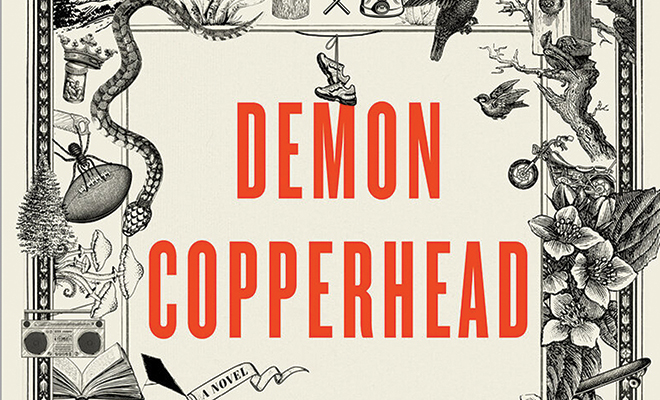
Demon Copperhead by Barbara Kingsolver
The story opens with the birth of our protagonist—named Damon but called Demon by everyone and Copperhead after his dad, who died before he was born. The young child doesn’t know anything different from his simple life in a trailer home. His mom loves him and is mostly present when she can string together a few consecutive days of sobriety, and he lives next door to his best friend, Matthew Peggot, called Maggot. They while away their days exploring and being boys. While they do not have much, Demon has never gone hungry or been profoundly lonely.
As Demon recounts his childhood in first person, he reflects on the simple yet happy early years when it was just his mom and him. The tides started to turn when she began a relationship with Stoner, a no-good, abusive man. What he contributed financially to the family did not outweigh the strain and violence that came with it. Demon experiences his first physical and psychological abuses at Stoner’s hand, and he’s faced with the reality that his mom chose to stand behind her boyfriend instead of protecting her son.
The stress of the abusive relationship finally breaks his mother, who relapses, overdoses and dies. Now an orphan, Demon is thrown into the world of foster care and exposed to atrocities no child should ever endure. At his first placement we are introduced to three other foster boys who work alongside Demon on a farm. As the novel progresses, their lives continue to weave and intersect. Some are able to make it out of foster care relatively unscathed, while others never overcome their childhood circumstances.
After his first foster placement, Demon experiences a myriad of highs and lows and is educated in the ways of the world. As he grows, his worldview is constantly tainted by adults who should do better but are either unable or unwilling. By the time he finds a mostly stable home, he is entirely unable to just be a kid. He follows in the footsteps of his parents’ addictions, and his life seems to almost be beyond saving.
Throughout Demon Copperhead, Kingsolver masterfully retells the Charles Dickens classic, David Copperfield. Just like Dickens, Kingsolver highlights some of the most severe social issues of the time, trading the prostitution and degradation of women of the 19th century with the foster care system and opioid pandemic of the 20th century. Despite the significant social issue changes over the course of the last 150 years since David Copperfield was first released, the significance and severity of poverty was one issue that remained consistent throughout both books. Kingsolver modernized the tale but stayed true to the essence and plot of David Copperfield.
While reading this novel, the first-person narrative pulls the reader into the life of Demon. It reads as though the story is being told aloud, incomplete sentences and grammatical mistakes and all. Thanks to Kingsolver’s mastery, this doesn’t distract but rather transports the reader to Demon’s side as he recounts the events of his life. The reader walks alongside Demon down some of the darkest moments of his life and experiences the dysfunction of the world he was born into. As Demon spends time with unsavory characters and makes questionable choices, you can’t help but empathize knowing the road he has walked down.
Tragic circumstances and people orbit around Demon, but there are a few who fight for what is good and right. Mr. and Mrs. Peggot, Maggot’s grandparents, selflessly cared for Maggot while waiting for his mom to be released from prison. They loved and nurtured not only Maggot but also Demon. Some of his teachers and even fellow foster kids prove to be a rock that Demon can rely upon in his greatest time of need.
From the outside looking in, it’s easy to judge and condemn alcoholics and addicts. In Demon Copperhead, readers are given a backstage view of the systemic poverty that leads to addiction. Kingsolver has created characters whose poor decisions are understandable and even relatable.
This 560-page tale is a significant time and emotional commitment but one worth making. It is a story of great suffering but also one of hope. Rarely can you find a novel that delves so deeply into systemic social issues without overtly preaching or taking a political stance. In Demon Copperhead, Kingsolver walks that tightrope beautifully, causing the reader to reflect and ponder a world that seems far away but is actually very close to home.







